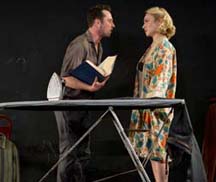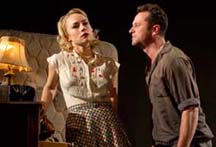|
Lucy KomisarThis "Look Back in Anger" shows a nasty working class guy who hates women"Look Back in Anger."
Women, in Gold’s view of Osborne’s script, are stupid twits who deserve to be abused, denigrated and treated as servants. They deserve it, because they are faithless creatures who can be placated with a good f—k. (Word excised to avoid this review being caught by spam filters.) But then I looked at a review I had written about a Classic Stage Company production in 1999 and thought I must have seen different plays.
I can’t remember a character as obnoxious and nasty as Jimmy Porter, who might be in his late 20s and is given a harsh portrayal by Matthew Rhys. He graduated from college but hasn’t made much of his life. He clearly thinks he is an intellectual of sorts – he reads the Sunday Times, Observer and New Statesman. He works at a candy stall run by his friend Cliff Lewis (Adam Driver), who is equally crude, but not as resentful as Jimmy. They live in a bed-sitter establishment in the Midlands, with Jimmy sharing an apartment with his wife, Alison (Sarah Goldberg), and Chris in a room downstairs. Chris spends most of his time with the Porters, arguing and rough-housing with Jimmy. Sarah seems to spend most of her time ironing. Ironic, because she came from an upper-class family. Is this penance? Or an acceptance of her rightful role? Jimmy’s anger, we are led to believe, stems from his working class resentment of the upper class. He cites the Bishop of Bromley who is "upset because someone has suggested that he supports the rich against the poor. He says he denies the difference of class distinctions. ‘This idea has been persistently and wickedly fostered by—the working classes!’ Well!" He doesn’t explain why, aside from his perception of upper class snobbery, he has a festering resentment against the rich. Did they keep him, a college grad and writer manqué, from getting a good job? We don’t know. This script was cut to remove some of the exposition against the class system’s economic impact – so you just get an angry young man without enough explanation about what is making him angry.
Jimmy struck his blow in the class struggle by marrying upper-class Alison and traipsing around with her to behave badly at the homes of her family’s friends. About Alison’s family he jibes, "Brother Nigel, the platitude from outer space. He’ll end up in the cabinet." About her mother: "She’s as rough as a night in a Bombay brothel." Alison is a convenient place to vent his fury. He insults her, calling her "pusillanimous" and "wanting firmness of mind." He accuses her first having no self, then of devouring him. At one point he spits out, "Women bleed us to death." The two fight bitterly and then play sexual games: he’s a bear, she’s a rabbit. It’s the only time he is civil to her. So it seems sex is what keeps them together. But a bear, of course, devours a rabbit. We don’t get enough of a sense from Goldberg about why she is effacing herself, why putting up with him. Just for sex? What is wrong with her? Goldberg is not very believable as Alison, who walks around in a silk kimono open to a bra and half slip. She apparently didn’t learn much about upper-class manners. By the way, she is supposed to be living a life of poverty with Jimmy for the past three years, yet her smart blonde hairdo looks as if she just stepped out of a beauty parlor.
Their lives are circumscribed, literally, by where they live. The set consists of a bureau with a radio and clothes hanging out of open drawers, a mattress standing against the wall, a couple of chairs, an ironing board, and a cupboard topped with a tea kettle. The floor is littered with debris – clothes, plates, newspaper – in an apartment nobody bothers to clean. (Funny that Alison, obsessed with ironing, doesn’t straighten up the place.) The back wall is pushed to the stage front, so that only about five feet holds the actors and furniture, creating a claustrophobia that is palpable. You hope nobody falls off the stage. Jimmy is clearly resentful that his life hasn’t taken off, he’s like an animal in a cage (the apartment could be a cage), but it’s hard to see why he is lashing out physically at Cliff and verbally at Alison.
He seems to get along best with visiting actress
Helena (Charlotte Parry), a friend of Alison’s, until
as you might guess, she does what Osborne obviously considers
the typical female betrayal. I looked back at the review I’d done about the Classic Stage Company production directed by Jo Bonney in 1999, and it was as if it were about another play. Maybe having a female director with politics made a difference. There you understand clearly that Jimmy’s obsessive resentment against the classes above him has destroyed his chance at professional success. And has landed him in a neurotic marriage with a passive-aggressive woman who is getting back at her parents at the same time she participates in a sexual game of furious fighting — mostly verbal abuse by Jimmy — and making up — his abject apology, her forgiveness. A shrink might call this psychological co-dependency. There, we see Jimmy confused about his own place in the world. His education seems to have led him to a point where he feels he really doesn’t belong in any class. He’s an intellectual snob, making an inordinate fuss about reading trendy columnists or listening to classical music, yet he refuses to identify with the hated educated elite. He is self-confident, articulate, cultured, yet so filled with class rancor that he can’t function. He has tried his hand at journalism, advertising, and selling vacuum cleaners, and now works in a candy stall. He is in a sex war as well as a class war. He rails against the oppressive upper classes, but is tyrannical toward women, especially his wife. In that production, Alison is drab, with an orange cardigan, black and white flecked strait skirt, and short pixie-cut hair, not an open silk kimono and a blonde super-do. I didn’t hate that play. I found it memorable
and powerful. Then I must fault director Sam Gold for the disappointment
of this production. | lobby | search
| home | cue-to-cue |
discounts | welcome | film
| dance | reviews
| |
||||||||





